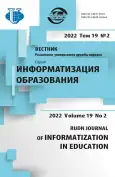Engineering design as a general area of study of informatics at the school of International Baccalaureate
- Авторлар: Anikanova K.I.1
-
Мекемелер:
- School No 1575
- Шығарылым: Том 19, № 2 (2022)
- Беттер: 157-164
- Бөлім: TEACHING COMPUTER SCIENCE
- URL: https://journal-vniispk.ru/2312-8631/article/view/321316
- DOI: https://doi.org/10.22363/2312-8631-2022-19-2-157-164
- ID: 321316
Дәйексөз келтіру
Толық мәтін
Аннотация
Problem and goal. The features of the work of the direction of engineering design are revealed, taking into account the peculiarities of teaching under the International Baccalaureate program as part of the school curriculum to prepare students for the choice of a future profile of education in high school. Objectives: 1) to analyze the features of the work of this academic subject, taking into account the specifics of teaching the subject group “Design” within the framework of the International Baccalaureate program; 2) describe the features of this direction; 3) sum up the results of the work and development prospects of students studying according to the presented curriculum, taking into account the peculiarities of the implementation of this curriculum. Methodology. A set of research methods was used: analysis of regulatory documents, determination of priority tasks for teaching this area, work experience. Results . The experience of working with secondary school students within the framework of the presented direction is analyzed, features and opportunities for further work are identified. Conclusion. Education taking into account the implementation of the features of the International Baccalaureate program allows students to prepare for the choice of a future profile (future profession), get acquainted with information opportunities, and prove themselves when working with various information technologies at an early stage of education.
Негізгі сөздер
Авторлар туралы
Kristina Anikanova
School No 1575
Хат алмасуға жауапты Автор.
Email: ms.kristina17@mail.ru
ORCID iD: 0000-0002-7840-2021
computer science teacher
23 Planetnaya St, Moscow, 125319, Russian FederationӘдебиет тізімі
- Anikanova KI. International baccalaureate and informatics lessons in modern school. Innovations and Quality of Lyceum Education: Ideas, Experience, Practice: IX All-Russian Shamov Pedagogical Readings. Moscow: Moscow Pedagogical State University; 2017. p. 78. (In Russ.)
- Berdashevsky ME. Consultations: goal-setting and competence approach in the educational process. Pedagogical Technologies. 2009;(4):89-94. (In Russ.)
- Seksenbaev K, Sultanova BK, Kisina MK. Information technologies in the development of the modern information society. Young Scientist. 2015;(24(104)):191-194. (In Russ.)
- Gureeva MA. Terminology of the International Baccalaureate in the variological aspect. Bulletin of the Chelyabinsk State University. 2011;(24(239)):137-139. (In Russ.)
- Grinshkun VV, Kornilov VS, Zaslavskaya OYu, Azevich AI, Andreikina EK, Bazhenova SA, Bogdanova OA, Vasilevsky SA, Lvova OV, Rudakova DT, Fateev AM. Informatization of education: a new direction in the training of teachers, a new activity, a new department. Bulletin of the Moscow City Pedagogical University. Series: Computer Science and Informatization of Education. 2010;(2(20)):19-23. (In Russ.)
- Krasovskaya LV, Isabekova TI. Use of information technologies in education. Pedagogy and Psychology of Education. Moscow: Nauchnyi Resultat Publ.; 2017. (In Russ.)
- Ivshina GV. Development of electronic educational resources: quality monitoring and implementation. Kazan: KGU Publ.; 2008. (In Russ.)
- Lazarev VS. Project activity at school: unused opportunities. Educational Issues. 2015;(3):292-307. (In Russ.)
- Osipovskaya EA. Trends in educational technologies in Russia and the world in 2020: analysis of search queries in Google Trends. RUDN Journal of Informatization in Education. 2021;18(4):291-304. (In Russ.) http://doi.org/10.22363/2312-8631-2021-18-4-291-304
- Shneider MYa. Assessment of the quality of education in the schools of the International Baccalaureate. Educational Issues. 2005;(1):1-27. (In Russ.)
- Lifshits MA. Random processes - from theory to practice. St. Petersburg: Lan Publ.; 2016. (In Russ.)
Қосымша файлдар









